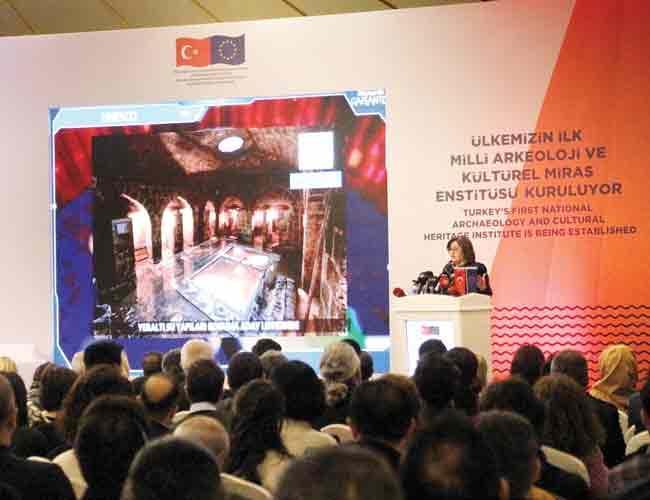Turkey establishes first national archeology institute with EU support
Sevil Erkuş - GAZİANTEP

Turkey has established its first national archeology institute in the southeastern province of Gaziantep, with more than 7 million euros of support from the EU. The European Union-Turkey Anatolian Archeology and Cultural Heritage Institute Project was kicked off on Feb. 26 and will take 36 months to finish.
Even though many foreign institutes and regional establishments have been in service for archeological works in Turkey, the establishment of a national archeological institute had taken a long time.
Kendirli Church will be renovated to host the country’s first national archeology institute, which will be under the Culture and Tourism Ministry and will be co-run by the Gaziantep Metropolitan Municipality.
Due to its affiliations with the ministry, the institute will contribute significantly to the sustainability of archeological research in Turkey, Alessandro Bianche, the team leader of the project, told the Hürriyet Daily News at the opening ceremony.
The project, funded by Instrument for Pre-accession Assistance (IPA) of the EU, is planned to be concluded in 36 months, with the restoration of the Kendirli Church to be completed in two years.
A total of 8.2 million euros has been allocated for the budget of the project, 7.5 million euros of this figure being EU funds. The project was initiated in 2014, but its implementation began on Dec. 21, 2018.
The project aims to preserve, promote and conduct research on the common cultural heritage so that intercultural dialogue and civil society dialogue between Turkey and the EU are developed. It is aimed to be a living institute in communication with researchers, students, academics, civil society members and the people through its library, laboratory, training, and consultancy units.
But the Culture and Tourism Ministry and Gaziantep Municipality aim for further goals through the project: Making Gaziantep the “capital of architecture,” according to Mayor Fatma Şahin.
The Culture and Tourism Ministry now has 203 archaeological excavations in various parts of Anatolia, and with rescue excavations and surface studies, this number exceeds 520, Ahmet Haluk Dursun, deputy culture and tourism minister, said. Thirty-one of them were conducted by foreigners, he said, noting that Americans were leading this work with eight excavations.
The EU Ambassador to Ankara Christian Berger said he believed that Gaziantep will be a hub of cooperation on archeology.
There is no coincidence that we are doing this here in Gaziantep given the important role Gaziantep is playing in cultural life, the ambassador stated. “I truly believe that this initiative has a potential to make Gaziantep a hub of the international cooperation on what European and Turkish archeologists have done and will do in the future,” he said.
“This center is the very tangible evidence of cooperation between the EU and Turkey,” he said.
Stressing that this institute will serve several aims, Berger noted that one of the goals will be to have a further inter-cultural dialogue between the EU and Turkey by means of the protection and promotion of common cultural heritage. “The institute will also provide accessibility to the ancient Anatolian civilizations’ archeological and historical heritage works by way of collecting, preserving and promoting,” he said.
The institute will provide a platform for joint research and analysis, training, internships for young experts, cooperation with international networks of archeology, exchange of knowledge, know-how, and sustainable archeology practices, he added.
The EU is no longer an “elite project,” Turkey’s deputy foreign minister and director of EU Affairs, Faruk Kaymakcı, said.
“The EU is no longer just a process negotiated by the diplomats on the table. Therefore, in an EU process, we want to include our local governments, municipalities, non-governmental organizations, universities, students, apprentices, masters, all of them, in the system and give special importance to civil society dialogue,” he added.
















